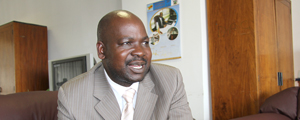
Elsewhere in this paper Attorney-General (AG) Johannes Tomana makes very grave threats against people perceived to be behaving in a manner that compromises the interests of the State. The threats present a very grim prospect, particularly for members of civil society and individuals or groups of people seen by the AG as violating laws that protect the interests of this country.
NewsDay comment
Coming from the AG, there is every reason for democracy seekers in Zimbabwe to be afraid because there are now very big chances of being thrown into jail if they dare criticise the administration or its systems in a manner the AG’s Office deems portrays the State or its appendages in poor light.
Tomana was yesterday delivering a belated response to a question by a delegate at the recent diamond indaba in Victoria Falls. The question (or was it?) was seeking to urge law enforcement agents in this country to deal with people who said things that resulted in the world viewing the Marange gems as possible conflict diamonds — even if the said things were supported by evidence and were, therefore, fact. The AG said this was a “very serious and honest question” and assured the concerned delegate that Zimbabwe, in fact, had “more than enough” laws to use against such people.
“We actually as a country have more than enough laws to protect us against all forms of violations against our interests. . .”
He went on to say he regretted that people were being left to go scot-free after violating these laws because law enforcement agents and his office were too tolerant.
“Let me tell you straight on,” Tomana said. “In trying to be tolerant, there has been a very tolerant manner of response to crime in this country. For the record, I am sure you remember particularly those from civic society. They have gone on the record to actually say those laws that protect us are bad laws and because they are bad laws they can be ignored . . . that is the reason why you would see people violating those laws in the name of democracy. . . the right to do those things that violate the law.”
He went on: “If we truly want this country to experience this hope that we are a secure country, an orderly country, a developing country, we need to upgrade our law enforcement and I want to share with you that from the security side, from the law enforcement side of this country, things are now going to be done differently. That level of tolerance is now suspended. I wish to advise accordingly.”
- Chamisa under fire over US$120K donation
- Mavhunga puts DeMbare into Chibuku quarterfinals
- Pension funds bet on Cabora Bassa oilfields
- Councils defy govt fire tender directive
Keep Reading
There is no reason to doubt that Tomana indeed believes the status quo is too tolerant and there is every reason to believe Zimbabweans should expect heavy police clampdown on people that may seek to expose State systems or bad behaviour by its officials for as long as the AG and those systems and individuals believe State interests have been compromised.
It is, however, instructive to observe that no mention is made by the AG of public interest nor was there clear definition of what State interests were at peril.











